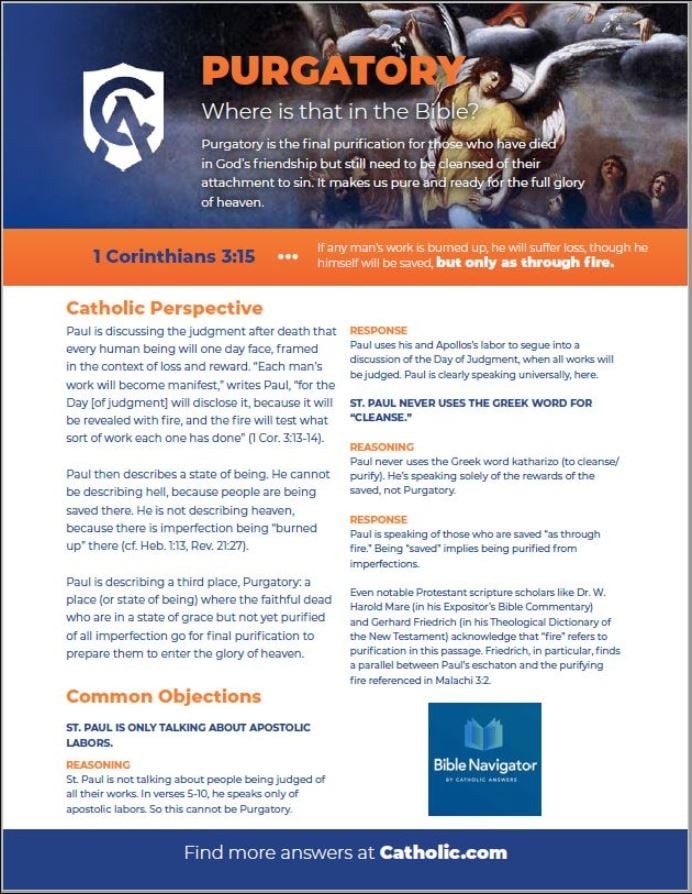Catholics believe in purgatory based on Scripture and Tradition. It’s understood as a necessary purification process for souls destined for heaven but not yet fully cleansed of the effects of sin. This belief stems from the understanding that nothing unclean can enter heaven (Revelation 21:27). While mortal sins are forgiven through confession and reconciliation, the temporal consequences of sin, along with venial sins, may remain. Purgatory addresses these remaining imperfections, preparing the soul for the perfect holiness required for union with God.
The Biblical Basis for Purgatory
Although the word “purgatory” doesn’t appear in the Bible, Catholics point to several passages as supporting its existence. One key text is 1 Corinthians 3:15, which describes a righteous person being saved “but only as through fire.” This “fire” is interpreted not as hell, since the person is saved, but as a purifying process.
Matthew 12:32 speaks of sins that can be forgiven in this age or the age to come, implying a post-mortem purification. Furthermore, 2 Maccabees 12:43-46 describes prayers and sacrifices offered for the dead, a practice that wouldn’t be necessary if there weren’t a state between heaven and hell where souls could benefit from such intercession. While Protestants removed Maccabees from their Bible, Catholics retain it as part of their canon.
Purgatory vs. Hell and Heaven
Purgatory is distinct from both hell and heaven. Hell is a state of eternal separation from God for those who die in a state of mortal sin without repentance. Heaven is a state of eternal union with God, reserved for those perfectly purified and holy. Purgatory, in contrast, is a temporary state of purification. It’s not a second chance for salvation but rather a final cleansing for those already saved. It is a process, not a destination.
The Purpose of Purgatory
The purpose of purgatory is to complete the process of sanctification begun in this life. Catholics believe that God’s grace, received through the sacraments and a life of faith, begins to transform us into his image. However, this transformation is often incomplete at the time of death. Purgatory allows for the final purging of imperfections, preparing the soul for the perfect holiness required to enter heaven. This purification is understood as a painful but ultimately joyful process, as the soul is drawn ever closer to God.
Misconceptions about Purgatory and Money
A common misconception is that the Catholic Church invented purgatory to profit from prayers for the dead. However, the small stipends offered for memorial Masses hardly contribute significantly to Church finances. Moreover, the practice of praying for the dead predates the formal articulation of the doctrine of purgatory, evident in early Christian writings and practices.
Purgatory in Catholic Tradition
The concept of purgatory developed gradually within Catholic Tradition. Early Church Fathers, like Augustine, discussed the need for purification after death. The term “purgatory” emerged later in the Middle Ages. The Catechism of the Catholic Church defines purgatory as a “final purification of the elect,” emphasizing its difference from the punishment of the damned. It is seen as an act of God’s mercy, allowing souls to be fully prepared for the beatific vision.
Conclusion
The Catholic belief in purgatory is a complex theological concept rooted in Scripture, Tradition, and the Church’s understanding of God’s holiness and mercy. It emphasizes the importance of ongoing purification and sanctification, even after death. While not explicitly named in the Bible, Catholics believe the concept aligns with Scriptural teachings about God’s justice, mercy, and the need for holiness to enter heaven. Purgatory offers comfort to believers, assuring them of God’s unwavering love and his desire for their ultimate perfection.
